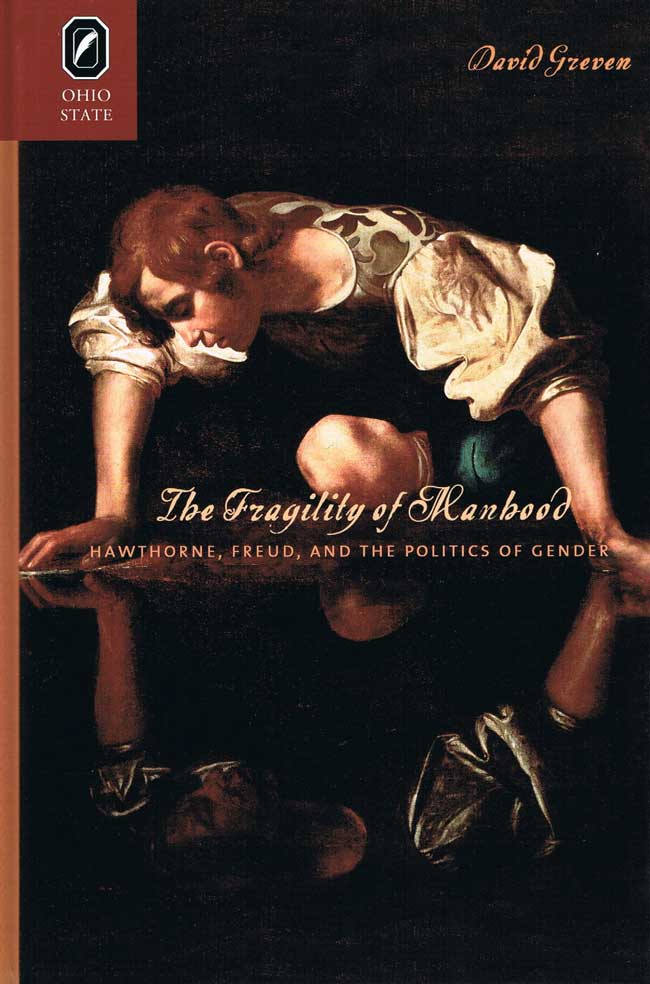|
One of Choice’s Significant University Press Titles for Undergraduates, 2011–2012 The Fragility of ManhoodHawthorne, Freud, and the Politics of GenderDavid Greven |
 10/22/2012 Literary criticism/American/General 311 pp. 6x9  $35.95 paper 978-0-8142-5288-8 Add paper to shopping cart Shopping Cart Instructions Review/Change Shopping Cart & Check-out | |||
|
Explore More Contermporary Freudian Society |
“In this psychoanalytical study, Greven argues that the Freudian Narcissus myth lies unmentioned behind many of Nathaniel Hawthorne’s novels and stories. . . . The strength of Greven’s study comes from his grounding in the field of gender politics.” —Choice “[I]nstructive and enlightening . . . Greven’s readings frequently cast Hawthornean texts in unfamiliar light. I especially like his inter-textual analyses. . . . The Fragility of Manhood provides a provocative and controversial take on the psychoanalytic dimensions of narcissism as it informs Hawthorne’s oeuvre.” —The Nathaniel Hawthorne Review “In retooling psychoanalysis both in the light of and as a way to explore gender, sexuality, and visuality in Hawthorne’s fiction, David Greven challenges the primacy of the Oedipus complex as the psychoanalytic paradigm of choice and focuses more heavily on Freudian narcissistic theory. In so doing, he offers venturesome, provocative analysis that sheds light on issues that are currently at the forefront of literary and cultural studies.” —Robert Abrams, professor of English, University of Washington “David Greven reinterprets both Hawthorne’s and Freud’s perspectives on masculinity by considering their shared concerns over the destabilizing effects of a narcissism that each saw as both foundational yet threatening to the formation and social operation of masculine identity. His analysis complicates conventional understandings of gender norms in the period, and of the intersections of masculinity, desire, and power, while offering new perspectives on Hawthorne.” —James Salazar, associate professor of English, Temple University Merging psychoanalytic and queer theory perspectives, The Fragility of Manhood: Hawthorne, Freud, and the Politics of Gender reframes Nathaniel Hawthorne’s work as a critique of the normative construction of American male identity. Revising Freudian and Lacanian literary theory and establishing the concepts of narcissism and the gaze as central, David Greven argues that Hawthorne represents normative masculinity as fundamentally dependent on the image. In ways that provocatively intersect with psychoanalytic theory, Hawthorne depicts subjectivity as identification with an illusory and deceptive image of wholeness and unity. As Hawthorne limns it, male narcissism both defines and decenters male heterosexual authority. Moreover, in Greven’s view, Hawthorne critiques hegemonic manhood’s recourse to domination as a symptom of the traumatic instabilities at the core of traditional models of male identity. Hawthorne’s representation of masculinity as psychically fragile has powerful implications for his depictions of female and queer subjectivity in works such as the tales “Rappaccini’s Daughter” and “The Gentle Boy,” the novel The Blithedale Romance, and Hawthorne’s critically neglected late, unfinished writings, such as Septimius Felton. Rereading Freud from a queer theory perspective, Greven reframes Freudian theory as a radical critique of traditional models of gender subjectivity that has fascinating overlaps with Hawthorne’s work. In the chapter “Visual Identity,” Greven also discusses the agonistic relationship between Hawthorne and Herman Melville and the intersection of queer themes, Hellenism, and classical art in their travel writings, The Marble Faun, and Billy Budd.
| |||


